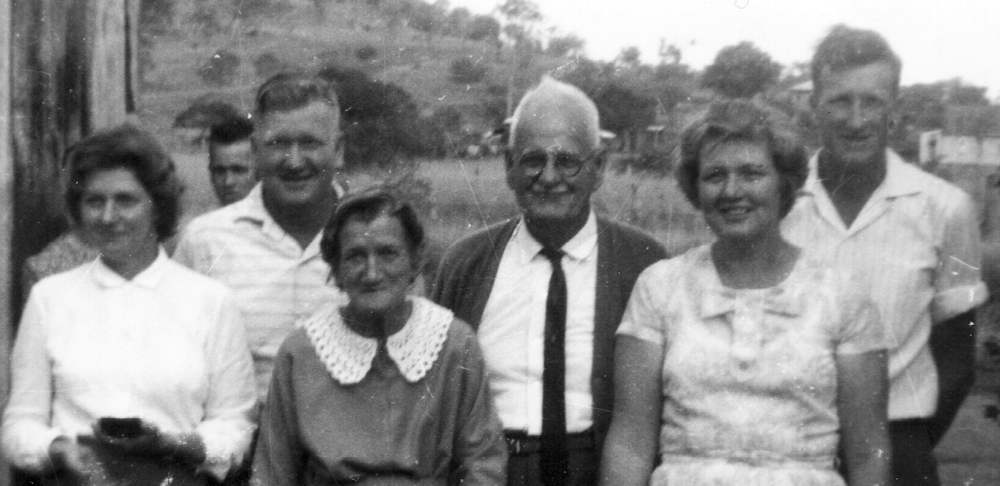Before he passed away in 2000, Ray Dobbs recalled life on the farm at Boolburra.
Looking back some 60 years I think how lucky we were; a family with not much money but a lot of love; no car, no TV or radio but had happy times; always something to do.
We had very few toys, mostly the ones we made ourselves; a piece of board, four treacle tins; two bits of wire and a piece of string and you had a car. We built roads all around the creek bank.
As we got bigger, we had to do jobs on the farm; taking the cows to the paddock, a job we liked as most days we got a ride home in a car with one of the farmers. It was wonderful not having a car of our own. Then we had to be feed the calves, up to 60 which used to take up a bit of time.
We all learnt to swim in the river and most hot Sundays we spent there. Then the tennis court which gave more social contact with the neighbours who came in on a Sunday. A lot of very happy times were had.
Christmas was the best time of all with seven cousins coming then. With no children to play with near us, it was a wonderful three-four weeks but very lonely for the weeks after.
Work, work, work
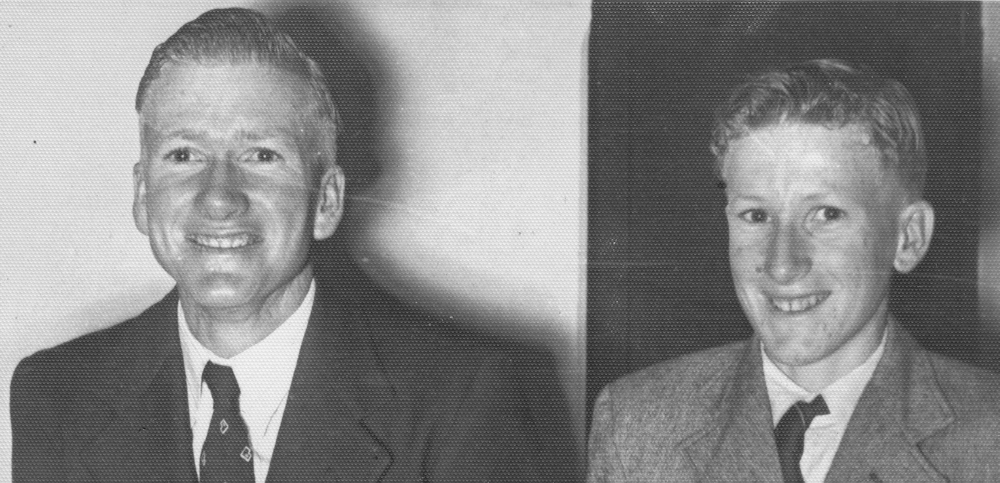
Brothers Ray and Jim Dobbs.
But childhood days soon slip by; soon you are a teenager and more work was to be done. Granddad Dobbs passed away, Mavis left home to go to a job in Biloela, June and I had to do more, there were miles of fencing to rebuild by hand (no drills) and June got married and moved on. In the early fifties I left to make my own way in the world.
Looking back I don’t think I’d like to change my childhood. We learnt a lot children don’t get today.
All the early ones to take up land were Irish and from the North and South, so there were fights on all the time.
Old lady Duffy (North) lived on her front verandah all day and watched everything that went on.
Davey Walsh lived over the river and came to get his mail at our house. But as soon as he appeared, she would start to yell out to Walsh. Her husband Jim would dash out; jump on his horse and go to meet Walsh.
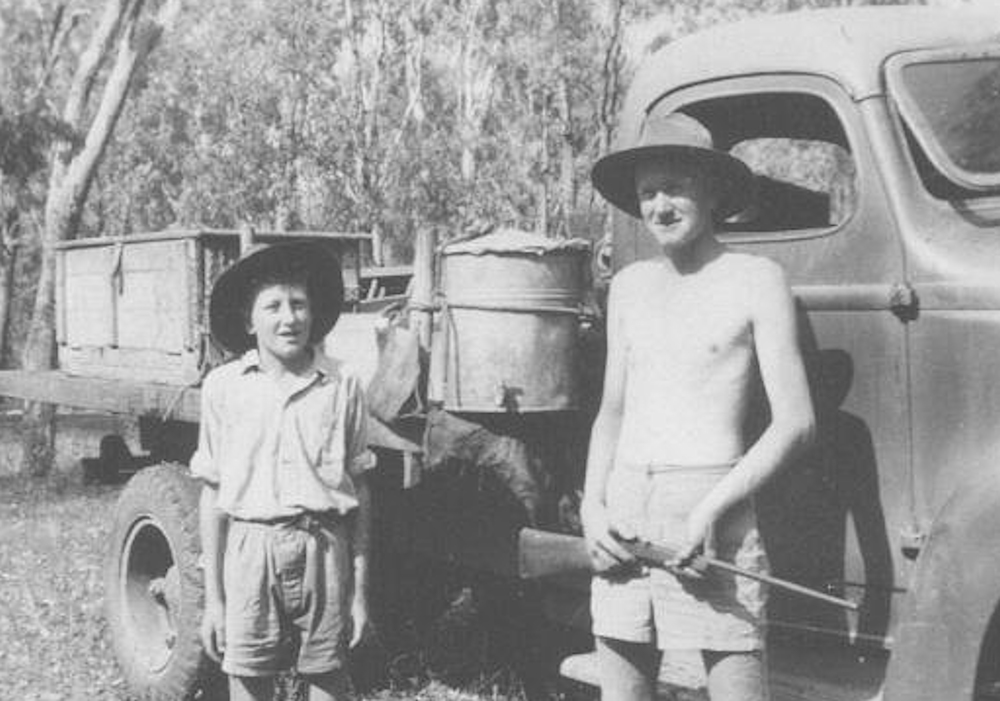
Jim and Ray Dobbs at Boolburra in 1940s.
A bit of conflict
Phil Kelly, who lived in a small hut, would got out and join in the fun. He used a walking stick. This day he got between the two riders and Duffy said, “get out of the way or I’ll run you down”. “Try it,” said Kelly.
Duffy charged him, Kelly up with his walking stick poking Duffy in the midriff knocking him off the horse. The old lady was yelling her head off but the fun was over for the day.
Grandad brought a new bed and it came up on the train. Phil Kelly was there. It was a new type and had cross webbing under to stop the sagging.
He poked it with his walking stick and said to Grandad, “Charlie, that’s the best buck-jumping machine I ever saw.”
Grandad gave everyone a fright one day coming up to get his mail in the sulky. The horse was a bit flighty; he had just crossed the railway line when the railway inspector started up the engine on his trolley. The horse took off around the corner on one wheel and headed for the river.
Everyone started to follow expecting to pick Grandad up in a heap but he had managed to stay in and keep the sulky upright and run it into a gum sucker and the horse quietened down. Read the newspaper report of the event.
Another story about Jim Duffy…
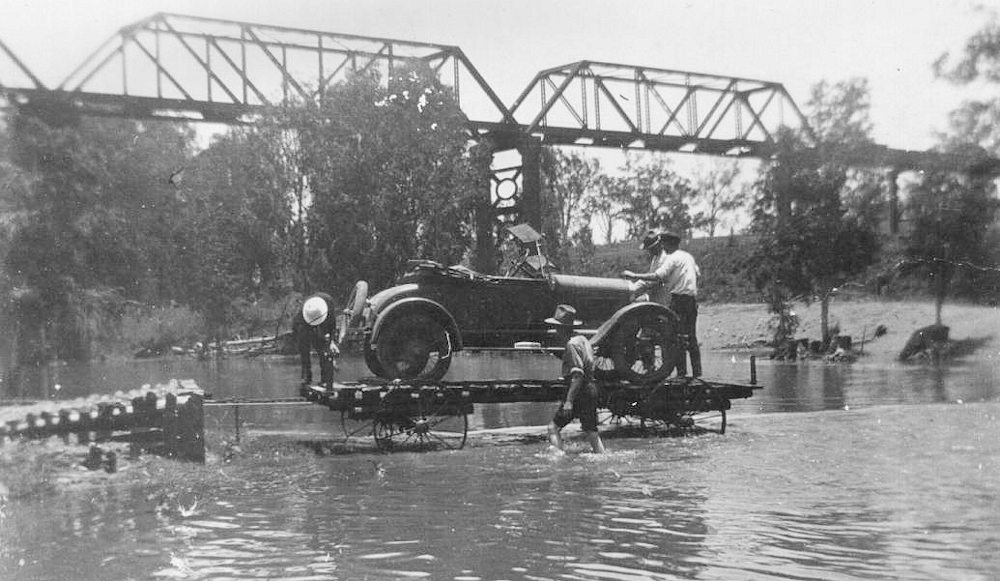
Charles Dobbs operated a punt to transport vehicles across the Dawson River at Boolburra.
One day after lunch he was having a shave, the mirror hanging on the wall when a black face appeared in it. He gave a loud yell and turned around and threw his razor at the window. He pulled on his shirt, went out to his horse and took off going in the opposite direction to the black.
Near the end of 1941, they started on the Dawson Bridge about four miles from home. All the timber came by rail to here.
Pop used to cart small things out and also do the pay run, as they could not cross the river. After Christmas it got too wet for trucks to move and he had to do more; the old Dodge used to love mud.
A road gang moved in and started to clear the trees (no D9); it was all done by hand. Some very large trees took days to dig out. Quite a few of this gang came from Bilo and returned there after the War.
In the middle of 1942 a large gang arrived from the west. The CCC with lots of trucks, rollers, tractors and two large graders; there was two train loads and about 80 men. They took most of the day to unload and also a big bridge gang set up near the range.
The Dawson road bridge was finished so that gang shifted off. Being Main Roads, the gangs left were CCC men.
The CCC (Civilian Construction Corps) which was made up of private contractors and anybody who the army did not want, you were just put in these gangs.
As the roads were getting finished a fencing gang was started. With some very hard placed to dig holes, they had to blow them. The crows were very bad in and their hundreds nearly driving the men mad.
One day they had some holes to blow which were in the shade. So they had lunch there and they all left lighting the charges. As the crows flocked in there was a big bang, dozens of crows were killed and dozens could not fly. There was no more trouble with the crows; after that they gave the gang a wide berth.
War years

Army convoy at Boolburra in 1942.
Things changed in 1940 for us; large convoys of army vehicles and a big flood all in the first four years. First the flood – 1942 – the river rose up high so we all left. The furniture, etc, loaded on to box wagons on the train, also Mum, June and James; they were to live in them for the next two weeks. Pop, May and I stayed to clean up; we had chooks to take out, a cat and a few other things.
We had a horse and a two-wheel trailer which was loaded. May wanted to go out on the bridge to rescue a poddy calf which was truck there as there was cattle coming down by the dozens and getting caught; the water was live waves.
Pop saw the water starting to break over the other side of the house so sent Mavis with the pushbike down the line and he and I with horse and wagon took off through the bush. The water was 2ft 6ins deep and running,
I was carrying the cat in a box over my shoulder. It was a bit hard as I was only 12 and not real big but we got through and only a few chooks got drowned. The water did not come into the house, so saved a lot of cleaning up.
After the flood the railway line over the river was a mess, hundreds of yards washed away. In one place the line was stood up like a two-rail fence.
Then came the men to repair; two or three gangs about 200 was camped near home, the sandflies were bad so two men with wheelbarrows were given the job to collect cow pats and had a large heap at the railway crossing so each man could fill his smoke tin going to work.
Mad dash
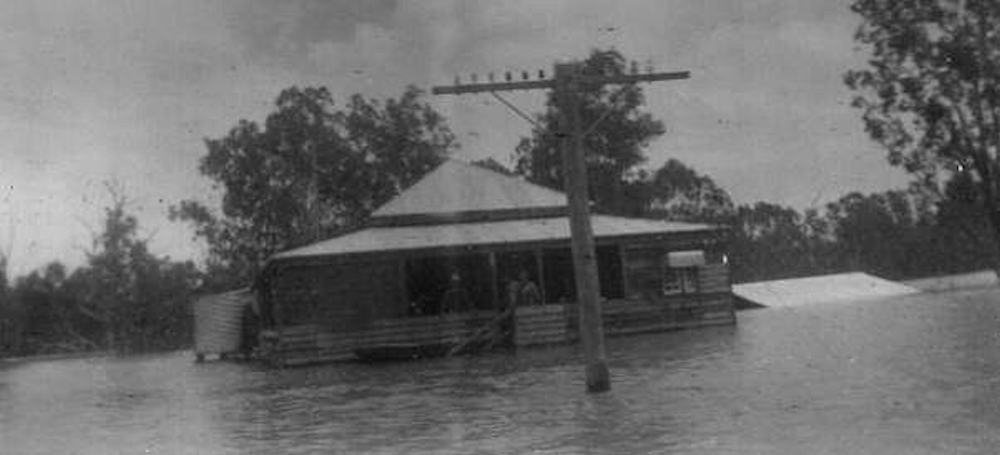
Boolburra house during 1954 flood.
With three gangs there a friendly rivalry went on who could get their trolleys on the line first, who could get home in the shortest time, which went on all the time. In the afternoon you heard a yell and a lot of cheering, you knew someone had copped it.
Later on in 1942 the army started to move the Australian front with over 30 trucks which amazed us with their size. Then a few weeks later the Yanks with larger ones, tandem drive, also semi-trailers; we just stood and looked.
One day 14 trucks and jeeps with three big semi-trailers arrived. There was 4ft 6ins of water in the river.
They spread out a tarp, drove the jeeps on, pulled up the sides, and floated it over. The jeeps and small trucks went like that then they pulled their winch trucks through as each one got over they were got going so they could be used.
Last came the semi-trailers. We thought they would wash away but a few ropes set up to hold them there was no trouble. It took them about five hours and they were ready to travel next morning.
Treated to a beer
There was an ammo dump about 14 miles from home and the Yank in charge used to call in home and get a drink of milk. He was very good, would get anything you wanted from Rockhampton; also Pop a bottle of beer (as it was not available to the public). Pop used to do a lot of things for them.
The bombs going to the dump used to travel in cattle trucks on the trains; whole train loads.
One night Pop and a friend were talking to the armed guard while the train took on water. They asked did he have an empty shell. He said no but would soon get one; poked his gun in the air and fired off two shots; they were tracers, so everyone could see them.
We had a pony very frightened of guns; he was still jumpy next morning and for days. Any noise he would jump. A lot of funny things happened in those years, it would take too long to write them all out.
Harold Cagney
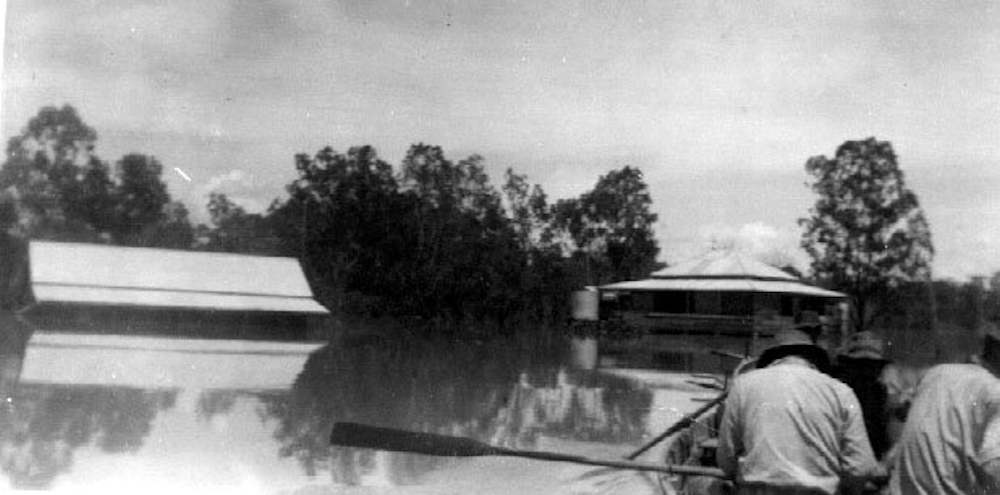
Boolburra during 1954 flood. Cross house at left and Dobbs home.
As told by Harold…
Going home after school one afternoon we found a koala up a tree. Norman found a long sick and started to poke it to make it cry. Just then the teacher, Miss Jelbart came along on the other side of the railway line and yelled out at them.
Norman took no notice so she started to cross the railway line so they took off. It did not help as at school next day we copped the cane. Norman was always a bit wild buying a motorbike. He took his sister for a ride.
A large bank of dirt was across the road which Norman tried to jump only to crash. His sister came down on the bike and carried the burn marks on her seat for the rest of her life.
Back in the 1800s there were blacks camped on both sides of the river.
This story was told by Tom Cross. One of the young blacks on the town side got a liking for a girl on the other side so would sneak over just before dark. This afternoon he was half way between the camps and the bridge when he was spotted.
The whole of the camp took after him. This afternoon one of the local lads had walked over the bridge just reaching the end as this chase started.
He thought they were after him, he took off, the black lad had crossed the river and was running through town like a flash; the local lad was no runner, but broke all records that afternoon.
As Grandma kept a lot of chooks and ducks, under the hall was the place for them to lay; only about 15ins off the ground. Someone small was sent under to clean out the eggs sometimes.
A nest was made and when a dance was on they started to bust, sending up a nice stink. One day a bird died under there and a lad was sent to get it. On reaching it he said, “Come on you bugger, you are not dead, you only think you are.”
Pulling the bird up under his nose he yelled out, “Shit, it stinks!

